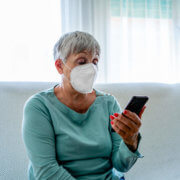Covid-19 testing options
Over the past month, COVID-19 cases and hospitalizations in the United States have hit a record high. To stay safe during this time it is essential to know the symptoms of COVID-19, follow CDC recommendations, and to get tested if you are symptomatic or exposed to the virus. However, with all the advances in science and various types of testing it can get confusing to understand the rapidly evolving information about COVID-19 testing. We hope this article will help you better understand COVID-19 testing.
Antibody tests
When it comes to COVID-19 testing, two main categories of tests exist: antibody tests and diagnostic tests. Antibody tests can determine if you have developed antibodies which means you may have been infected with the COVID-19 virus in the past. However, antibody tests cannot tell you if you have an active case of COVID-19. Your doctor can help decide if an antibody test is right for you. An antibody test might be recommended if you had symptoms of COVID-19 in the past and you were not able to get tested, or if you have symptoms of COVID-19 and other types of tests are coming back negative. If you want more information about antibody tests you can read this article on antibody testing from John Hopkins Medicine.
Diagnostic tests
Healthcare professionals most often use diagnostic tests to diagnose people with an active case of COVID-19. Fortunately, these tests can now be administered in a number of ways. While many tests are administered by healthcare professionals at a clinic or testing site, some diagnostic tests can now be done at home. Samples are most often taken from a patient’s nose or throat area, but some tests can now use samples of saliva. Results from diagnostic tests can be delivered in minutes (rapid point of care tests), or may take days or even weeks depending on how fast they can be processed in a lab. Rapid point of care tests, often simply referred to as `rapid tests”, have the capability of analyzing patient samples in a clinic or at a doctor’s office. For this reason, results from rapid tests may be available for patients within minutes. Other diagnostic tests that are not rapid tests, send samples to a lab where they are analyzed. Analyzing results in a lab requires increased time and results may not be available for days or weeks.
One important thing to know, is that diagnostic tests are considered either molecular tests or antigen tests. Antigen tests, sometimes called rapid antigen tests, tend to deliver results more quickly, but are more likely to miss an active case of COVID-19. For this reason, if you are exhibiting symptoms of COVID-19 and receive a negative antigen test your doctor might recommend that you also get a molecular test to ensure that you do not have an active case of COVID-19.
What to do?
Most importantly if you think you might have COVID-19 or have symptoms of COVID-19 it is important to contact your healthcare provider, local pharmacy, or local health department to find out about testing in your area. You should also make sure you isolate yourself from exposing others until you have confirmed test results.
If you want more information about COVID-19 testing you can visit the FDA’s webpage on COVID-19 testing basics.
Don’t forget to follow Assured Allies on Medium, Facebook, Twitter, and LinkedIn!








